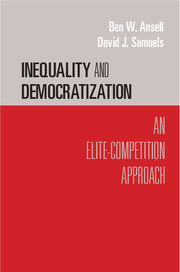Book contents
- Frontmatter
- Contents
- List of Tables
- List of Figures
- Preface
- I Introduction
- 2 Inequality, Development, and Distribution
- 3 Actors and Interests
- 4 An Elite-Competition Model of Democratization
- 5 Assessing the Relationship between Inequality and Democratization
- 6 Inequality and Democratization: Empirical Extensions
- 7 Democracy, Inequality, and Public Spending: Reassessing the Evidence
- 8 Democracy, Redistribution, and Preferences
- 9 Conclusion
- Bibliography
- Index
I - Introduction
Published online by Cambridge University Press: 05 January 2015
- Frontmatter
- Contents
- List of Tables
- List of Figures
- Preface
- I Introduction
- 2 Inequality, Development, and Distribution
- 3 Actors and Interests
- 4 An Elite-Competition Model of Democratization
- 5 Assessing the Relationship between Inequality and Democratization
- 6 Inequality and Democratization: Empirical Extensions
- 7 Democracy, Inequality, and Public Spending: Reassessing the Evidence
- 8 Democracy, Redistribution, and Preferences
- 9 Conclusion
- Bibliography
- Index
Summary
WHY DEMOCRACY?
What explains the emergence of democracy? Why did some countries democratize in the nineteenth century, while others never have? Which social groups are relatively more or less important proponents of regime change? Does economic growth promote democracy, and if so, how?
Debate about answers to these questions continues. In recent years, scholars have turned away from the question of whether economic development per se fosters regime change, and begun to explore the question of whether the distributional consequences of economic development help explain patterns of democracy and dictatorship.
In particular, a set of papers and two influential books by Daron Acemoglu and James Robinson (henceforth “A&R”: 2001; 2006) and Carles Boix (2003) have propelled research in this new direction. These books offer what we call redistributivist theories of regime change, in that they focus on how economic inequality—the relative distribution of income or assets—impacts voters' demand for redistribution. All else equal, redistributivist arguments suggest that inequality harms democracy's prospects because, in intensifying voters' desire for redistribution of autocratic elites' wealth, it generates a similarly intense reaction by those same elites, who will dig in their heels to maintain the political status quo. In an equal society, demand for redistribution would be weaker—as would elite opposition to liberalization.
In reinvigorating research on the “economic origins of democracy and dictatorship” (the title of Acemoglu and Robinson's book), redistributivist approaches implicitly adopt the fundamental tenet of Modernization Theory— that political change can follow economic change. Yet they add an important new twist, in drawing our attention to the fact that economic development can have very different political consequences, depending on how the growing economic pie is divided up. Such arguments begin with an apparently straightforward contrast between autocracies, which restrict the franchise, and democracies, which allow the poor greater voice and vote. Logically, because there are always more poor people than rich people, franchise extensions lower the average voter's income, which should increase demand for redistribution. When such redistributive pressures are high, economic elites will—out of self-interest—resist granting the poor the vote.
- Type
- Chapter
- Information
- Inequality and DemocratizationAn Elite-Competition Approach, pp. 1 - 16Publisher: Cambridge University PressPrint publication year: 2014



